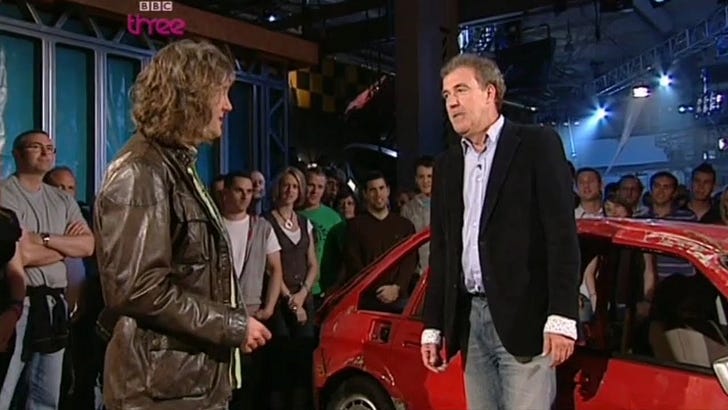It’s common to hear one describe themselves as ‘ambitious’ but rarely with the added ‘but rubbish’ behind — unless, of course, they're talking about Top Gear.
For those unfamiliar, Top Gear is a British motoring show from the 2000s. In it, the three hosts, Jeremy Clarkson, James May and Richard Hammond often described their own show as ‘ambitious but rubbish’. It’s so iconic that there are even compilations of these moments.
The cool part is that 'ambitious but rubbish' wasn't just a clever soundbite or self-deprecating humour to entertain the audience. It actually formed the very essence of the show.
From converting cars into boats, redesigning police vehicles and even ending world hunger, every Top Gear episode saw the three hosts tackle some insane and epic challenges. This as you can imagine, falls under the ‘ambitious’ portion.
And then there was the execution. It was always unorthodox, often disastrous, and completely lacking the usual polish you'd expect from ‘serious’ undertakings. Things broke. They sank. They caught fire. That's formed the "but rubbish" part.
Entertainment aside, this idea really resonated with me and has informed my way of life a lot.
For the most part, it’s easy to understand why tackling big and difficult challenges fulfils one. But it’s this unique combination of being ambitious + rubbish that I found appealing.
In this context, being rubbish isn’t about not putting out quality work. The guys at Top Gear are incredibly thoughtful with their craft, making them one of the best storytellers out there.
Instead, to be rubbish is more about not taking oneself too seriously and being okay to stay outside the box. A lot of it emphasises ‘play’ mode over ‘work’ mode. To be okay not doing things that might not align with conventional wisdom, being light-hearted and creative. Only in this mode can you truly take risks and tackle the type of ambitious challenges that require novelty and some degree of contrarianism. You will do a lot of ‘stupid’ things to achieve the goal. But stupid is fine. Failure here is less about the outcome than the process. If you don’t have fun during the process, you haven’t succeeded in being ‘rubbish’. The icing on the cake is that if on the off chance, you do have a successful outcome, you get to say what Frankie (or Jovi) said:
I did it my way
Starting a startup is probably one of the big decisions that I’ve made trying to be ‘ambitious but rubbish’. In my subsequent posts, I would love to share a theory that I have been working on regarding how people make career choices using this ‘ambitious but rubbish’ idea.
Interesting reads from last week
Southeast Asia: Resetting Expectations
Interesting reconciliation of past expectations and present state of things
The point about India + China not being representative of SEA makes sense.
Even though ecommerce in the early days looked very similar to China, there are a lot of new characteristics unique to SEA emerging because of sociocultural and economic structure reasons.
While the report was oriented around consumer tech and not SaaS, it was still indirectly relevant for SaaS founders selling into SEA like myself
Consumer tech is usually a pre-cursor to SaaS
To assess readiness for consumer tech, the report used the term ‘monetisable users’.
This is similar to the concept brought up by Kunal Shah that the Average Revenue Per User (ARPU) or more specific SaaS metrics like Average Contract Value (ACV) is a function of the Per Capita Income of a country.
In other words, the no. of monetisable users can predict both SaaS readiness and ACV potential
It seems that the sentiment of the report is that we are not very ready yet.
Like Lightspeed, I am long SEA. But building a bootstrapped company, I can’t always optimise for the long game. This report is making me reflect a lot of how and where I should place my bets.
In essence, to have extraordinary outcomes, you need to do extraordinary things and make them seem ordinary
Over-doing things raises the bar for not only yourself but others too
Over-doing things can create compound effects that pay dividends over time
Of course, this is overly simplistic (something that was probably intentional on the author’s part).
It’s important to identify what you want to be good at overdoing.
‘Over’ means breaching some form of limit. You can’t over-over do. You can’t break all the limits. It’s either not sustainable or downright impossible.
Not unless you are Shohei Ohtani.
Finding the right things to be ‘over’ at is equally, if not, harder



